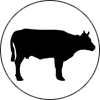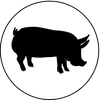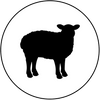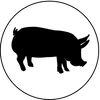When it comes to marketing within the protein industry, misinformation often prevails, sometimes intentionally and sometimes not. As consumers, when we shop at supermarkets, we're presented with an illusion of choice. Aisle after aisle offers a variety of brands and labels that seem to promise quality and ethical sourcing. However, this diversity is often superficial. In reality, a significant portion of these products comes from just a few conglomerates known as the 'BIG 4'. These companies—Cargill, Tyson, JBS, and National Beef—dominate the beef market, while Tyson Foods, Pilgrim's Pride, Sanderson Farms, and Perdue Farms hold substantial sway over the poultry market. This concentration of control affects everything from market prices to the standards of meat quality and safety, often compromising the independence of small farmers and misleading consumers.
For example, take Chicken. Over 30 brands you will find at your local grocery store are made by the same 4 companies:

The same applies to beef, pork and seafood. For example, most of the beef production in the USA is controlled by a handful of large corporations known colloquially as the "BIG 4" — Understanding their impact can help you make more informed choices about the quality and sourcing of the meat you consume.
INTRODUCING THE BIG 4
The protein industry in the US is VERY concentrated. Four companies control 80% of the beef market in the US and other 4 companies (with some overlap) control 60% of the poultry market.
Beef Market: Cargill, Tyson, JBS, and National Beef. Just JBS has annual revenue of $52 BILLION dollars and they, along other major players invest billions in acquiring feedlots, processing plants, and even retail operations, securing their supply chain from farm to table.
Poultry Market: Tyson Foods, Pilgrim's Pride (owned by JBS, which is also a major player in the beef market), Sanderson Farms, and Perdue Farms.
WHY SHOULD YOU CARE?
Having so much control of the industry they have influencer over everything from market prices to the standards for meat quality and safety. In a nutshell, they can host farmers hostage.

JBS USA, a subsidiary of Brazilian conglomerate JBS S.A., showcases a powerful example of vertical integration in the beef industry. This corporate giant extends its reach across the entire production spectrum, maintaining stringent control from feedlot operations to processing facilities to retail. By owning and operating its own feedlots, JBS directly controls the diet and care of the cattle, ensuring they meet the company's specific standards for quality and efficiency. This level of oversight continues as the cattle move from feedlot to slaughterhouse, all of which are owned by JBS. This not only guarantees product consistency but also significantly reduces costs that might otherwise be incurred through reliance on third-party services.
The financial influence JBS holds over farmers and ranchers also plays a critical role in its business model. JBS often offers financing to these producers, which might seem beneficial at first but can tie them to stringent repayment terms and obligations to meet JBS's production criteria. This financial dependency can limit farmers' operational independence, effectively holding them hostage to JBS's terms. As a result, many farmers find themselves in a precarious position, with limited freedom to make decisions that best suit their operations outside of the corporate interests of JBS. This dynamic showcases a broader industry trend where large corporations dictate terms across the supply chain, often at the expense of smaller producers' autonomy and financial stability.

Now companies like JBS are investing billions trying to expand their supply chain all the way to the direct consumer which is why they have developed and funded Wild Forks Foods. This way their power will reach from the financing farmers need to pay for the feed all the way to the retail counter.
THEY EVEN HAVE INFLUENCE ON LEGISLATION
The legislative influence exerted by the "BIG 4" in the protein industry extends to substantial lobbying efforts aimed at shaping policies that directly impact food safety regulations, labeling standards, and other critical aspects of the industry.
These corporations invest millions of dollars annually in lobbying to ensure that legislation aligns with their business interests, which can and often run counter to consumer interests for transparency and safety. For instance, these companies have been known to push for more lenient labeling laws that allow for vague terms such as “natural” or "hormone free" without clear definitions, making it difficult for consumers to understand what they are actually purchasing. Additionally, their lobbying efforts often target regulations around animal welfare and environmental standards, seeking to soften rules that might otherwise impose higher costs or stricter operational constraints. This powerful influence in shaping policy not only highlights the control these companies wield over the market but also underscores the challenges faced by regulators and consumers in navigating the complex landscape of food safety and quality standards.
IMPACT YOU CAN SEE
Packages lie to you and the industry lobbies for the law not to change. Here are a few examples:
Certainly, the food industry is rife with marketing terms that can be misleading due to their vague or unregulated definitions. Here are more examples of such terms:
-
"Natural": This is one of the most commonly used labels on food packaging. It suggests that the product is minimally processed and free of artificial substances. However, the term "natural" is not strictly regulated by the FDA, which means it can be used liberally without substantiating the claim, leaving room for a wide interpretation that might not align with consumer expectations of products that are free from all synthetic and artificial ingredients.
-
"Free-Range": For poultry, this label suggests that the birds have access to the outdoors. However, there are no requirements on the amount of time the animals spend outside, or the quality and size of the outdoor space, making it less meaningful than consumers might believe. For instance, the access could be just a small door leading to a limited outdoor area that is not necessarily used by the animals.
-
"Hormone-Free": Often seen on beef, poultry and pork products, this label can be misleading because the use of hormones in raising poultry and pigs is already prohibited by federal regulations. Thus, every pork and poultry product is hormone-free by law, making this label redundant and potentially misleading by implying a special quality that does not actually distinguish these products from others in the market.
-
"Farm-Fresh": This term evokes images of small-scale, pastoral operations, but there is no regulatory definition or standard. It can be used by any producer regardless of farm size or the methods they use, which may not necessarily match the pastoral idyll consumers might imagine
- "Antibiotic-Free": This label is intended to assure consumers that no antibiotics were administered to the animals during their lifetime. While it suggests a healthier and more natural production process, the label can be confusing. In the U.S., any meat from animals that have been administered antibiotics must be cleared of antibiotics before they can be slaughtered, as regulated by the USDA. Therefore, technically, all meat could be considered "antibiotic-free" at the point of consumption. Moreover, the more precise term regulated by the USDA is "Raised Without Antibiotics," which assures that the animals were never given antibiotics from birth to slaughter. The "antibiotic-free" label, while commonly used, isn't officially defined or regulated, which can lead to misinterpretations about its meaning and the health implications associated with it.
This is not to say these companies haven't done any good; the beef industry in the USA is among the best in the world. But, in todays day and age, the same companies that have innovated to much are now slowing it down. How is a farmer supposed to innovate when everything from the crops, to the feed, to the butchering of their proteins is one way or another influenced by one brand.
However it is undeniable that the considerable influence wielded by the 'BIG 4'—Cargill, Tyson, JBS, and National Beef in the beef market, and similarly dominant players in the poultry sector—raises significant concerns about market monopolization and its impact on consumer choice and product transparency.
While these corporations have driven innovation and efficiency in meat production, their extensive control over the market stifles competition and limit options for both producers and consumers. The pervasive issue of misleading labeling practices further complicates the landscape, making it difficult for consumers to make informed decisions based on their health, ethical, and environmental values.
As consumers, it’s crucial to remain informed and vigilant about where our food comes from and how it is produced. Advocating for stricter labeling laws and supporting policies that promote fair competition in the market are essential steps towards ensuring that small farmers and independent producers can thrive. By choosing to buy from local sources and demanding clearer, more honest labeling, consumers can help drive change towards a more transparent and sustainable food system. In doing so, we not only support ethical practices but also enhance the quality and safety of the food on our tables.
Ultimately, the power to shape the future of the protein industry lies in the hands of informed consumers who choose to act thoughtfully and purposefully.

















